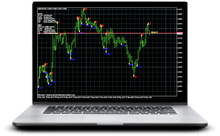Indices
Indices
What are indices?
There are hundreds of thousands of companies that trade their securities on the stock exchanges. Indices come in handy when you have to track changes in the prices of the countless securities and understand the sentiments of the market. Indices make it possible to assess the state of the stock market as a whole and to determine the current moment in the economic cycle.
Investors use stock indices both to estimate the situation on trading platforms and to predict future trading results. Indices are calculated for different countries, industries or for a certain group of securities: stocks, bonds and other assets.
How are stock market indices calculated?
Indices are divided into groups according to their calculation methodology. Some of the most common are:
- Arithmetic index. The market prices of the shares included in the index are added up and the resulting sum is divided by the number of included shares.
- Weighted average index.The calculation involves the multiplication of each number in the data set by a predetermined weight. In price-weighted indices, each company's stock is weighted by its price per share, and the index is an average of the share prices of all the companies. As a result, stocks with higher prices have a bigger impact on the movement of the index than those with lower prices. An example of such an index is the Dow Jones Industrial Average (DJIA). In capitalization-weighted indices, also known as market value-weighted indices, the weighting of a particular stock is determined by its total market capitalization. In such indices, stocks with a larger market cap have a higher weighting and any movements in their share prices will have a larger impact on the index performance. The most familiar example of such an index is the Standard & Poor's 500 (S&P 500).
- Geometric average index. It is calculated from the growth rate of stock prices. Indexes of this type include the FT 30 Index created by the Financial Times and the Value Line Composite Geometric Index.
Benefits of index trading
In general, indexes have several purposes.
- To get an idea about the general dynamics of stock quotations of a certain group (companies, countries, industries, etc.). Often this data is used for speculative trading.
- Getting information about investors' attitudes. If indices are increasing it means that investors have a positive attitude to investments in certain stocks.
- Indexes monitoring over a long period of time gives an idea about the investment climate in a certain country.
- Often, in addition to the index value itself, information is published about the total turnover of shares of its constituent companies. Changes in these figures give an indication of the overall activity of traders in the market in transactions with securities of a certain type.
What are the most traded indices?
The most well-known international indices that you can trade with FBS include:
- NASDAQ 100 Index (US100),
- FTSE 100 Index (UK100),
- Nikkei 225 Index (JP225),
- Australian Stock Index (AU200).
How to choose traded indices?
To choose indices for trading, first of all, you need to pay attention to the factors that can affect the quotes. Namely:
- Macroeconomic indicators. GDP, the level of industrial production, trade balance. Even the levels of inflation and unemployment can have an impact on quotations. For example, an increase in unemployment in conjunction with other indicators may indicate a decrease in consumption followed by a decline in company revenues.
- Economic and political events. US elections, military conflicts, sanctions, trade wars, international trade agreements all affect the future profits of companies, and consequently, indices.
- Traders’ sentiments. These are traders’ attitudes to market and economic prospects. The majority opinion plays a big role.
Index futures for hedging
Index futures is a type of contract in which a stock index serves as an underlying asset. In other words, it combines the qualities of both a futures contract and a stock index.
Investors often use index futures for hedging, opening short positions against the stocks in their portfolios. The underlying assets are not the shares of a single company, but of a number of companies. It means that the risk of a complete collapse is minimal. Even during the crisis, investors who hedged their portfolios with index futures emerge from the crisis with minimal or no losses.
Using index futures to speculate
In addition to hedging, experienced traders use index futures for speculation on the price movement of an index. This means that a trader buys or sells index futures to bet on the direction of price of a group of assets.
Conclusion
Stock indices are not just analytical information. This is a full-fledged working tool, with which you can make independent transactions, assess the state of the industry, and conduct fundamental analysis of the market. And on top of it, the risks of index trading are always lower than those of investing in individual stocks.
2022-08-25 • Updated











